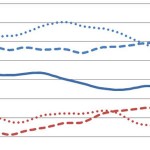Building Cities for Urban Planners
Aaron Renn makes the point that urban planners should give some thought to the type of area that a particular city should be, given its unique geography, history, and competitive advantages, rather than prioritizing their vision of the ideal city:
Where Ashland Ave. BRT fails is not in its attempt to improve transit service or to accommodate those who choose not to have cars. Rather, the problem is that it is rooted in a vision, propounded mostly by coastal urbanites, that believes car use should be deliberately discouraged and minimized – ideally eliminated entirely – in the city. Thus the project is not just about making transit better, but also about actively making things worse for drivers. That might work in New York, San Francisco, or Boston, where the car is more dubious, but in Chicago this philosophy would erode one of the greatest competitive advantages the city enjoys. In Chicago, the car free strategy only works along the north lakefront and downtown, not the Ashland Ave corridor or most of the rest of the city.
The no-car philosophy as the norm, not just an option, would undermine one of the greatest strategic advantages of Chicago. Why would you want to do that? Particularly when it would also make family life in the city more difficult for many. There is where urbanists need to start putting on their strategic thinking hat. Otherwise they may end up undermining the very places they seek to improve.
Renn seems to think this is a Midwest versus Coast dynamic, but Rhode Islanders should put on their strategic thinking hats, too. One of the great advantages of the whole state is the ability to move around. On a whim, when a business associate was staying in Providence, we zipped down to a restaurant near First Beach in Newport for breakfast. Sports leagues regularly direct my family around the state. Based on my experiences and positive things that are generally said about Rhode Island, progressives’ war on cars — like just about every progressive policy — would only hurt Rhode Islanders.
This point has a much broader application. With RhodeMap and every other central-planning project undertaken by the state government, the fatal flaw is the conceit that planners can and should figure out what the state needs and push it in that direction. The people of Rhode Island have a much better sense of the attractions and advantages of their state than any small group of planners, and they aren’t going to give over their information at public meetings, even if the planners could correctly interpret what they were saying, because only a narrow subset of Rhode Islanders ever knows about such meetings, let alone bothering to attend.
The solution is freedom, with money as the measurement of what people are doing. With freedom and capitalism, businesses can identify opportunities at a very small, local level, and the people will tend to get more of what they want, and in an improved way.


